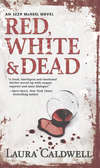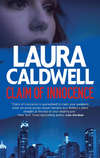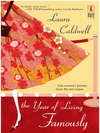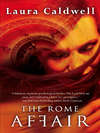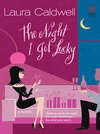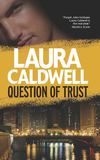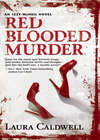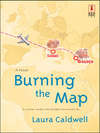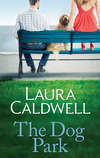Buch lesen: «Red, White & Dead»

Praise for the novels of
LAURA CALDWELL
Red, White & Dead “A fresh, intelligent and emotional thriller. Laura Caldwell writes with an assured ease, showing a true sense of style and story, delivering a brilliant and complicated heroine.” —New York Times bestselling author Steve Berry
Red Blooded Murder “Aims for the sweet spot between tough and tender, between thrills and thought—and hits the bull’s-eye … A terrific novel.” —No.1 New York Times bestselling author Lee Child
“Take Izzy McNeil to bed tonight. You won’t get much
sleep, but you’ll spend tomorrow smiling. Red Blooded Murder is smoking hot and impossible to put down.” —Marcus Sakey, author of Good People and The Blade Itself
Red Hot Lies “A legal lioness—Caldwell has written a gripping edge-of-the-seat thriller that will not disappoint.” —New York Times bestselling author Steve Martini
The Good Liar “A massive achievement, in one novel, launching a woman right up there with the top thriller writers around.” —International bestselling author Ken Bruen
The Rome Affair “A fabulous, hypnotic psychological thriller. Laura Caldwell is a force we can’t ignore.” —New York Times bestselling author Stella Cameron
Look Closely “A haunting story of suspense and family secrets … you won’t want to put it down.” —New York Times bestselling author Mary Jane Clark
The Night I Got Lucky “Caldwell is one of the most talented and inventive … writers around.” —Booklist
The Year of Living Famously “Snazzy, gripping … an exciting taste of life in the fast lane.” —Booklist
A Clean Slate “A page-turner about a woman with a chance to reinvent herself.” —Chicago Tribune
Burning the Map “A touching story of a young woman at a crossroads in her life.” —Barnes & Noble.com on Burning the Map, selected as one of “The Best of 2002”
RED, WHITE & DEAD
LAURA CALDWELL

Dear Reader,
The Izzy McNeil series is fiction. But it’s personal, too. Much of Izzy’s world is my world. She’s proud to be a lawyer (although she can’t always find her exact footing in the legal world) and she’s even more proud to be a Chicagoan. The Windy City has never been more alive for me than it was during the writing of these books—Red Hot Lies, Red Blooded Murder and Red, White & Dead. Nearly all the places I’ve written about are as true-blue-Chicago as Lake Michigan on a crisp October day. Occasionally I’ve taken licence with a few locales, but I hope you’ll enjoy visiting them. If you’re not a Chicagoan, I hope you’ll visit the city, too, particularly if you haven’t recently. Chicago is humming right now—it’s a city whose surging vibrancy is at once surprising and yet, to those of us who’ve lived here a while, inevitable.
The Izzy McNeil books can be read in any order, although Izzy does age throughout, just like the rest of us. Please e-mail me at info@lauracaldwell.com to let me know what you think about the books, especially what you think Izzy and her crew should be doing next. And thank you, thank you, for reading.
Laura Caldwell
Thanks also to everyone who read the book or
offered advice or suggestions, especially Dustin
O’Regan, Jason Billups, Liza Jaine, Rob Kovell,
Katie Caldwell Kuhn, Margaret Caldwell, Christi
Smith, William Caldwell, Matthew Caldwell,
Meredith Caldwell, Liz Flock, Kris Verdeck
and Les Klinger.
ACKNOWLEDGEMENTS
Thank you so very much to Margaret O’Neill Marbury, Amy Moore-Benson and Maureen Walters. Thanks also to everyone at MIRA Books, including Valerie Gray, Donna Hayes, Dianne Moggy, Loriana Sacilotto, Craig Swinwood, Pete McMahon, Stacy Widdrington, Andrew Wright, Pamela Laycock, Katherine Orr, Marleah Stout, Alex Osuszek, Erin Craig, Margie Miller, Adam Wilson, Don Lucey, Gordy Goihl, Dave Carley, Ken Foy, Erica Mohr, Darren Lizotte, Andi Richman, Reka Rubin, Margie Mullin, Sam Smith, Kathy Lodge, Carolyn Flear, Maureen Stead, Emily Ohanjanians, Michelle Renaud, Linda McFall, Stephen Miles, Jennifer Watters, Amy Jones, Malle Vallik, Tracey Langmuir, Anne Fontanesi, Scott Ingram, Deborah Brody, Marianna Ricciuto, Jim Robinson, John Jordan and Brent Lewis.
Grazie mille to Andrea Rossi in Rome for answering my many questions about the Camorra and the anti-Mafia efforts in Italy, and grazie to Francesco Marinuzzi and Laura Roberts for their assistance with all things Italia.
Much gratitude to my experts—Chicago Police Officer Jeremy Schultz; criminal defence lawyers Catharine O’Daniel and Sarah Toney; pilot Jonathan Sandrolini, private investigator Paul Ciolino; journalist Maurice Possley and physicians Dr Richard Feely and Dr Roman Voytsekhovskiy.
PART I
1
When it happened, it happened at night, the way bizarre things often do.
For a Sunday, and nearly midnight, the restaurant was buzzing. That’s the way Sundays work in Chicago. Often the city is quiet—most people tucked under sheets by 10 p.m., newspapers sprawled on the floor below them. Other times, on a Sunday in June like that night, when the weather plays nice—the occasional puffed cloud skimming across a crystallized blue sky, a sky that gently settles into a soft black without losing the day’s warmth—things can get a little raucous. And I’m the kind of girl who likes a raucous Sunday now and again.
So even though Rush Street wasn’t my usual hangout, if I’d been surrounded by friends at that corner table at Gibsons Bar, the one by the windows that looked onto the street where people still strolled and lights still burned, I would have been very happy. But I wasn’t with friends.
Dez Romano threw his arm over the back of my stool. Dez, short for Desmond, had dark black hair, even though he was surely a few years past forty, and it curled in pleasing twists, like ribbons of ink around his face. The somewhat thick bridge of his nose was the only coarse thing on Dez Romano’s face, and he managed to make that look spectacularly handsome. He was so confident, so lit up with energy that you began to think every man should have such a face.
The story I’d been told by John Mayburn, the private investigator I moonlighted for, was that Dez had been named by his mother after a Catholic cardinal whom she admired. The religious connotation hadn’t helped. Dez was now the head of his family business, as in the family business. Dez was, as Mayburn had said, “the new face of Chicago’s organized crime.”
Dez smiled at me now. I thought a smile by such a man would be flashy, a surface grin that easily revealed danger underneath. But it was genuine. Or at least it appeared so. I’d been told that, in some ways, Dez was the new kind of Mafia—the kind who had friends from all walks of life around the city, who opted, when possible, for courting rather than strong-arming, who made large donations to charities, not because he or his family business wanted something from them, but simply because every respectable business did so.
I returned Dez’s smile, thinking that the problem with Dez wasn’t his looks and it wasn’t that he lacked generosity, whether toward a woman like me, whom he’d met at the bar, a woman supposedly stood up by a flaky friend or toward his associates. The problem was, at least according to the suspicions of the federal government, Dez ran an intricate business, an arm of the Italian Camorra, believed to be more ambitious and more ruthless than the Cosa Nostra faction made famous by The Godfather movies. In other words, Dez was also the old kind of Mafia. He wasn’t afraid of strong-arming or something much more violent. No, not at all.
“So, Suzanne,” Dez said, using the alias I’d given him, “where to from here?”
I laughed, looked at my watch. “It’s almost midnight. I’d say home is where I’m going from here.”
“And where is home?”
“Old Town,” I answered vaguely.
I really did live in Old Town. When Mayburn first taught me to assume a cover name in order to conduct surveillance, he told me to always blend in some reality—some truth that couldn’t be easily tied to your real life—or otherwise you’d forget or confuse yourself, and you could land in some very real trouble.
The blending of such truths hadn’t exactly helped. My occasional moonlighting gig for Mayburn had gotten me into more than a little trouble, but I hadn’t been able to turn him down this time.
I need a favor, Izzy, he’d said, earlier that night. I want you to hang out at Gibsons. Act like you’re meeting a friend at the bar, act like the friend canceled on you. Dez Romano is always there on Sunday. Throw that red hair over your shoulder and give him the famous Izzy McNeil smile. Talk to him. See if he says anything about Michael DeSanto.
I didn’t say that there was no “famous Izzy McNeil smile” that I knew of. I didn’t point out all the things that could go wrong with this little “favor.” Instead, I agreed rather quickly. Not because I needed the money, which I did, but because Mayburn was in love, the first time I’d witnessed such a thing. And yet it appeared he was about to lose his beloved to Michael DeSanto, a banker we’d helped put in jail for laundering money for the Mob. Correction: laundering money for Dez Romano.
“My car is outside,” Dez said. “Let me give you a lift.”
“That’s all right. I’m a taxi kind of girl.” I pointed out the window, where a few Yellow Cabs and Checkers floated by. “I won’t have a problem. But thank you for dinner.” I waved at the table toward the bottles of wine and grappa and the desserts in which we’d barely made a dent.
Dez answered that it had been wonderful, that he’d like to see me again. “I guess I should have asked before,” he said, with a shy shrug that surprised me. “You’re single, right?”
I answered honestly—”I am.”
A few short months before, I’d juggled three men, and then suddenly there were none. Today, one was staging a comeback, and I wasn’t sure what to do about that. In the meantime, although I was occasionally tortured about those who had left my life, I was free to date whomever I wanted. Even a ranking member of the Mafia, if only as a part-time job.
If I hadn’t known who he was and what he did for a living, I wouldn’t have blinked before agreeing to go out with Dez. I was about to turn thirty, and with my birthday fast approaching, it seemed the dating gods had flipped a switch in my head. I had never dated anyone much older than me, never really been interested, but now Dez’s forty-some years compared to my twenty-nine seemed just fine.
Dez leaned his elbows on the green-and-white tablecloth and shot me a sexy kind of smile. “Would you go out with me sometime? Officially?”
Officially, I was about to say, Sure, This was what Mayburn had hoped would happen. I would listen for anything having to do with Michael DeSanto, and if nothing came up, I’d establish a contact with Dez so I could see him again, so I might learn something about Michael in the future.
I looked out the window once more, thought about how to phrase my answer. And then I saw him.
He was standing across the street at a stop sign, wearing a blue blazer and a scowl. He glanced at his watch, then up again, and as the cars slowed, he began to cross the street, right toward us.
I opened my mouth. I must have looked shocked because Dez followed my gaze.
“Hey, it’s DeSanto,” he said fondly. He looked back at me.
I clamped my mouth shut and met his eyes, trying to cover my panic with a bland expression.
His eyes narrowed. “You know DeSanto?”
“Urn …” What to say here? Actually, we met when I was pretending to be friends with his wife, Lucy, in order to sneak into his office and download files to incriminate him. Isn’t that ironic?
Mayburn and I had decided that if I was successful tonight and got to Dez Romano, and if I could somehow steer the conversation toward Michael DeSanto’s name, I would ask about Michael, maybe volunteer that I’d once met Lucy—the woman Mayburn was now in love with—at my gym, or someplace similarly benign. But that plan had assumed I wouldn’t actually see Michael; it assumed that Michael wouldn’t pull open the door to Gibsons, and walk right in, and find me with his buddy, Dez.
I stood up. I leaned forward, hoping to distract Dez with a little cleavage. It worked. His narrowed stare relaxed. He glanced up at me and, to his credit, then kept his eyes there.
Meanwhile, my eyes shot toward the door. And there was Michael DeSanto, stopping to say hello to the maître d’.
Frig, I thought, attempting to stick with my stop-swearing campaign despite the circumstances. But I gave up quickly. Fuck, I thought. What is he doing here?
According to Lucy, her wayward husband was out of jail on bond, and although he was friendly with his compatriots of old, like Dez (all of whom had managed to avoid prosecution through one loophole or another), he wasn’t doing business with them anymore. Rarely saw them much at all. As such, Lucy had felt it her duty, especially for her kids, to break up with Mayburn and give it a go with Michael, the father of her children, the man she was, or at least had been, in love with. And so their Lincoln Park home once again blazed bright, as did the lights on the security gates surrounding it. The whole thing had rendered John Mayburn bordering on positively vacant, which spooked me. Which was why I’d found myself agreeing to try and infiltrate the world of organized crime.
Yet now Michael was here, just out of jail, clearly stopping in to see Dez Romano. And about to come face-to-face with the person who was instrumental in putting him in jail. Me.
I took a step away from Dez, muttering, “Be right back.”
I moved in the direction of the bathrooms, but when I realized it would put me in a collision course with DeSanto, I shifted, started to go the other way. I froze when I realized the exit and the bathrooms were both just beyond where Michael was standing.
He stopped then, completely still, looking at me with his eerily light brown eyes. He froze in exactly the same way an animal does when assessing a dire situation—with the knowledge that this might be the end, this might be the time to meet the maker, but with a sure clarity that there was going to be a fight before the end came.
I froze, too. I wished at that moment that I was better at this stuff, but no matter how much I’d learned from Mayburn, the whole undercover thing was simply not in my blood.
And so, lacking anything better to do, I gave Michael DeSanto the same smile I gave lawyers at Chicago Bar Association events when I didn’t recognize them—a sort of Hi, how are you? Good to see you kind of smile.
Physically, DeSanto looked a little like Dez Romano, but he wasn’t even glancing at his friend right now. His intent stare stayed focused exactly on me. He cocked his head ever so slightly. His face jutted forward then, as if he were straining to understand. And I knew in that moment that it was one of those situations—he’d recognized me, sort of, but he couldn’t place me. Yet. I was sure he’d figure it out any second.
I didn’t wait for the wheels to start clicking in his mind. Instead, I averted my gaze and hightailed it to the right, then veered back behind him. I glanced across the room at the front door. It was clogged with a huge group of people saying goodbyes, giving each other boozy pats on the back. I could sense Michael turning around to stare at me, so I darted up the staircase and bolted for the bathroom.
I panted inside the stall, trying to work out what to do. Should I somehow try to say goodbye to Dez? Should I give up on the infiltration job and just take off for the calm confines of my condo?
It wasn’t much of an infiltration job anyway, just a job that required chatting up someone at a bar, a task I used to be rather good at, if I say so myself. However, that skill had gone rusty over the last few years. Who could blame me after my series of, shall we say, unfortunate circumstances. Two friends killed and a disappearing/reappearing fiancé, who was now officially off the map, had caused me to spend a lot of time in my condo, licking my wounds.
Eight months ago, I’d been on top of the world—the highest paid associate at a big, glitzy law firm, en route to partnership not only with the firm but with my fiancé. And then poof, all gone, rendering me tired and stunned and jobless. What I’d been doing for the last few months consisted of nothing more than feeling guilty about doing nothing.
Shortly, my funds would literally drop to zero, causing my fears about being forced to sell my Old Town home to become a reality.
And so this request from Mayburn, who believed Michael DeSanto wasn’t as squeaky clean as he was telling his wife, led me to Dez Romano. But enough was enough. Heartbroken or not, Mayburn would understand that I had to get out of there.
I left the bathroom, went down the first flight of stairs, peeked down the rest of the way, my hands on the silver banister. I saw no one. The large group appeared to have left. I trotted down as fast as my high heels would allow, past the signed photos that plastered the walls—everyone from local judges to international celebrities seemed to have autographed a glossy for Gibsons.
My breath was managing only shallow forays into my lungs, so I stopped once to suck in air. A few more steps and I was at the bottom, the front door only a few feet away.
The maître d’ gave me a bored nod as if to say goodnight. But then he glanced to the right, and a questioning expression overtook his face. I peeked to see what he was looking at. Michael. Across the room, Michael was talking to Dez, his arms waving, gesturing.
Right then, Dez looked over Michael’s shoulder and saw me. “Hey!” he said, his eyes narrowed in anger.
There were only a handful of diners in the restaurant, but Dez’s voice was loud enough to get everyone’s attention. They looked at Dez, then at me. Suddenly, Dez and Michael were on their feet and coming toward me, the furious expressions on their faces enough to catapult me into action.
I reached down, pulled off my high heels and dashed out the door onto Rush Street.
“Cab!” I yelled, waving at one. But the taxi’s light was off, and it blew by. Same with the next one and the next.
I took off running toward Oak Street, hoping desperately for the shimmering vision of a cab with its light on.
I heard someone shout. Glancing back, I saw Michael and Dez sprinting after me. Behind them was another man, also running, his head down, face obscured by a baseball cap. Was he security for Dez?
I tucked my shoes under my arm and ran faster. When I reached a tiny alleyway, I dodged down it, running until I came to a parking garage.
“Ticket?” a sleepy valet said.
I heard footsteps pounding behind me in the narrow alley. Frantically, I looked around. The garage’s entrance was on State Street. I could leave that way, but if I did, surely Dez and Michael and their muscle would see me and keep up the chase. To the left, though, was a steep ramp that quickly curved up and out of sight. If I could get up the ramp before they reached the garage, I could hide and call Mayburn for help. I could call the police if I had to.
I started in that direction.
“Miss!” the valet yelled. “Your ticket?”
“My car is up here,” I said as I kept moving.
“No, miss! Only valet here. You have a ticket?”
I hesitated for a moment. I thought about reversing and bolting for State Street, but it would take too much time. They would see me for sure. Then it dawned that if I kept running up the ramp, the valet would probably follow me, which would be a good thing, since he couldn’t tell Dez and Michael where I’d gone.
I was about to start climbing the ramp again, but it was too late. Dez and Michael pounded into the garage. No sign of their security guard.
Dez and Michael both wore blazers; both had that great Italian black hair. And both looked as though they would very, very much like to kill me.
They ran up the ramp as if to do just that. I turned and sprinted off.
When the ramp curved to the right, I figured I had only a few seconds to vanish. There were rows of cars parked in spots marked Reserved. I dodged behind a green Jaguar and crouched there, my heart banging violently against the walls of my chest. My dress, made of lavender silk, was damp with sweat and clinging to my body.
I held my breath, afraid to make a sound. But meanwhile, I heard no sounds of Michael or Dez. Surely, they’d seen me. Surely, they were just behind me. I swiveled my head around, feeling exposed. All they would have to do was look around the side of the car and they would spot me. And then what would they do?
I kept holding my breath. Silently, I placed my heels on the ground, bent down farther and tried to see under the carriage of the car. It was so low I had to kneel. Jagged concrete dug into my skin. My curly hair fell over my eyes. I brushed it away, bent lower and looked under the car.
My breath filled my lungs with a rush, almost like a punch. Because there, on the other side of the Jaguar, were two pairs of beautiful Italian loafers. Michael and Dez were standing there. They clearly hadn’t heard me yet. But they were just waiting for me to make a sound.
My mouth opened in a terrified O. I began to pant again, this time silently.
I looked behind me and saw a door, maybe leading to an interior staircase. I peeked under the car again, and to my horror, I saw those beautiful Italian loafers start to move.
I stood and lunged for the door. Locked. Fuck. I was immediately chastised by my internal swearword replacement monitor, but once again Frig just wasn’t going to cut it.
I spun around and faced them, shooting frenzied looks around the place, trying to figure out if I could dodge them and make a run for the street. They were still on the other side of the car, moving slowly, almost creeping. Dez was nearly to the front of the Jag.
“So what’s your real name, little girl?” Dez said.
“It’s not Isabel Bristol,” Michael growled. Isabel Bristol was the name I’d used when I first met him.
“And it’s not Suzanne,” Dez said, no shyness about him now, only a sinister sneer. “C’mere, little girl.”
I took a step back, then another. I was backing myself into the locked door, I knew, but the only impulse my body could muster was to recoil from Dez and Michael. My eyes swung wildly. Where was their security guard?
I took another step back. My bare feet stepped on something oily, then on the heels of my own shoes. Swiftly, I reached down and picked them up, thinking of some TV show I’d seen once where a stiletto was used to kill someone. I tucked my purse tighter under my arm. I brandished my high heels like ridiculous satin-covered weapons. There was nowhere else to go.
I tried to think of something to say, but it was clear there would be no chatting with these guys, no talking my way out of the situation.
It didn’t matter anyway, because Dez charged around the car toward me. Instinctively, I moved back again, bouncing against the door. And then I was propelled forward as the door opened behind me. I was only a foot from Dez now, Michael behind him.
I felt a hand grip my arm and yank me back, hard, into the stairwell. The security guard. It must be.
“No!” I yelled, thrashing against him. “No!”
But the guy pulled me in farther, and then he did the strangest thing. He slammed the door, right on the puzzled faces of Dez and Michael.
It was black in the stairwell. I could see nothing. Dez’s and Michael’s fists battered the door from the outside, sounding like tribal drums, loud and menacing and alerting everyone of more danger to come.
I struggled against the grip of the security guard, and to my surprise he let me go.
“You’re okay,” he said.
I trembled a little, wanting to run but unable to see anything, not knowing where to go. It sounded as if Dez and Michael were pounding the door handle now, trying to break it.
“You have to leave,” the man said. “You need to get out of here.”
Why did his voice sound familiar, as if I were listening to the note of a song I had heard only a few times?
I felt a touch on my wrist. “Stop!” I yelled out of sheer instinct, pulling it away. In the deep dark of the stairwell, the movement made me feel dizzy, and I willed myself to stand straight.
“Let me show you the banister,” he said. “Walk down the steps and out onto the street. Get away from here as fast as you can.”
“But …”
Scratching sounded from the direction of the door handle now, as if Michael and Dez were putting something in the lock.
“Hurry,” the man said. “They’ll be in here very soon.”
Enough of a threat to get me moving. I tucked the purse tighter under my arm and clutched both shoes in my left hand. The man touched the wrist of my right hand again, and this time I let him lead me to the banister.
“Hold tight,” he said. “Be careful. But please go as fast as you can.”
I took one step, then another. Then I stopped. “Thank you,” I said.
“You’re welcome.” Again, there was a distantly familiar quality to his voice.
I turned and put one foot on the lower step and then the next. I began to get the hang of it, despite the blackness around me. When I got to a landing, I shuffled my feet forward, looking for where the next steps began. Upstairs, I could hear more thrashing at the door.
Then, for a moment it quieted, and I heard the man speak. “Go. You’re okay now, Boo.”
The pounding at the door continued. An injection of fear kept me moving, finding the staircase, taking the steps faster this time, until I reached the street and pushed open the door, the streetlights hitting my eyes like a blast. I blinked and looked around. No sign of Michael or Dez. Not yet.
I saw a cab, lights on, across the street. I ran to it, yanked open the door and hopped into the back. Breathlessly, I gave my address on Eugenie Street.
It was only when the cab had driven eight blocks that I stopped looking behind me. Then I closed my eyes, laid my head on the back of the seat and let myself hear the last words the man had said.
You’re okay now, Boo.
Was that right? Had he actually said that?
I forced myself back to that moment, listening intently to the memory.
You’re okay now, Boo.
Boo was the nickname my mother used for me. No one else had ever called me that. Except my father.
And he had been dead for almost twenty-two years.
